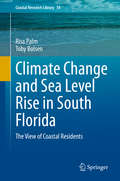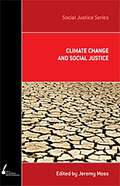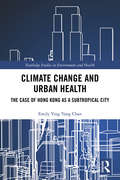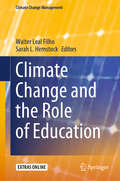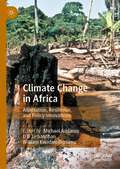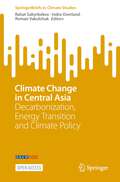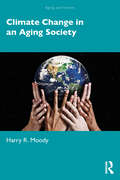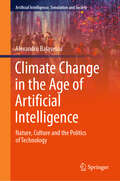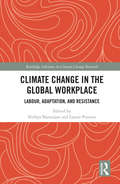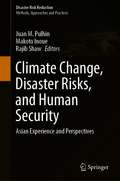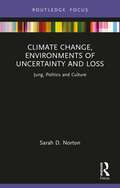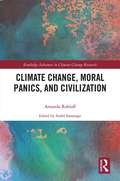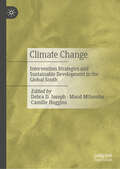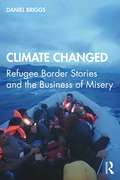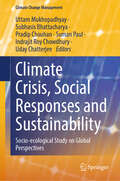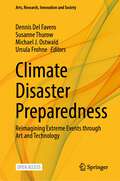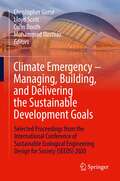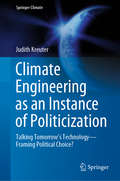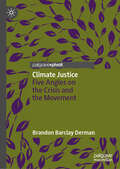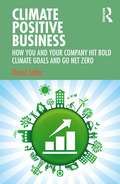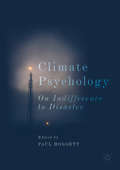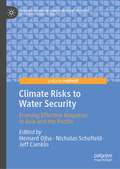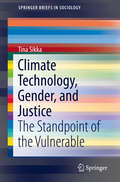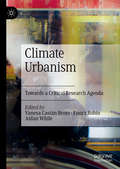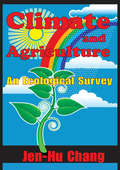- Table View
- List View
Climate Change and Sea Level Rise in South Florida: The View of Coastal Residents (Coastal Research Library #34)
by Risa Palm Toby BolsenSouth Florida is frequently cited as the part of the United State of America as most susceptible to the devastation accompanying sea level rise. Several scholarly studies have shown the negative impact of coastal location in Florida on housing values. Are the residents of South Florida concerned? Is susceptibility to sea level rise actually affecting the housing market in terms of demand, the availability of home mortgages, or house prices? Are people living at particular risk from sea level rise aware of this risk and more open to new information about climate change? Do they support policies and laws to mitigate the pace and extent of climate change? Answers to these questions are not only of general interest, but they are also key to our understanding of the human dimensions of this problem. This book describes the results of a detailed survey in which respondents viewed a local map displaying flooding to their own community that would result from a Category 3 hurricane in 2033. It discusses political party identification and ideology that has an overwhelming impact in shaping views about sea level rise and climate change. This book has enormous implications for the effectiveness of communicating risk information. The text is important if we, as a nation, are to design communication strategies that will lead to broader policy to combat or mitigate this risk.
Climate Change and Social Justice
by Jeremy MossThe impacts of climate change can already be felt in society and on the Earth itself. As new evidence of the environmental impact of climate change is constantly emerging, we are forced to confront the significance of our political decisions about who will pay the price of responding to a changing climate. In the rush to avoid or reduce the repercussions of climate change, we need to ensure that the burden is evenly distributed or run the risk of creating injustice. Climate Change and Social Justice demonstrates that the problem of how to distribute the costs of climate change is fundamentally a problem of justice. If we ignore the concerns addressed this book, the additional burdens of climate change will fall on the poor and vulnerable. Jeremy Moss brings together today's key thinkers in climate research, including Peter Singer, Ross Garnaut and David Karoly, to respond to these important issues.
Climate Change and Urban Health: The Case of Hong Kong as a Subtropical City (Routledge Studies in Environment and Health)
by Emily Ying ChanThis book provides a theoretical framework and related technical skills for investigating climate change and its public health consequences and responses with a focus on urban settings, and in particular Hong Kong, a subtropical metropolis in Asia. Specifically, the book examines the impact of climate change on health in terms of mortality, hospital admissions and help-seeking, as well as key response strategies of adaptation and mitigation. Many existing books tend to consider the relationship of climate change and public health as two connected issues divided into various discrete topics. Conversely, this book explicitly applies public health concepts to study the human impact of climate change, for example, by conceptualising climate change impact and its alleviation, mitigation and adaptation in a public health framework. Overall, this volume summarises what is known about climate change and health and ignites further debates in the area, especially for urban subtropical communities from within a wider global perspective. This book will be of great interest to students and scholars of environmental health, public health, climate change, urban studies and Asian studies.
Climate Change and the Role of Education (Climate Change Management)
by Walter Leal Filho Sarah L. HemstockThis book offers insights into the educational dimensions of climate change and promotes measures to improve education in this context. It is widely believed that education can play a key role in finding global solutions to many problems related to climate change. Indeed, education as a process not only helps young people to better understand and address the impact of global warming, but also fosters better attitudes and behaviours to aid efforts towards mitigating climate change and adapting to a changing environment. But despite the central importance of education in relation to climate change, there is a paucity of publications on this theme. Against this background, the book focuses on the educational aspects of climate change and showcases examples of research, projects and other initiatives aimed at educating various audiences. It also provides a platform for reflections on the role education can play in fostering awareness on a changing climate. Presenting a wide range of valuable lessons learned, which can be adapted and replicated elsewhere, the book appeals to educators and practitioners alike.
Climate Change in Africa: Adaptation, Resilience, and Policy Innovations
by Michael Addaney D B Jarbandhan William Kwadwo DumenuThis edited collection chronicles the public policy responses to climate change and current and potential impacts that will affect critical and priority sectors within and across African countries now and in the coming decades. Contributions cover governance and policy responses to climate change, emphasizing continental governance and policy responses, national governance and policy responses (what selected countries in Africa are doing), and local or community policy and programmatic responses (what some selected major African communities are doing). Each chapter adopts multi-disciplinary and transdisciplinary approaches, combining insights from social and policy sciences, emphasizing existing gaps, particularly in the area of decision-making, governance and local climate action. The book offers both theoretical and practical contributions, with the aim of advancing academic discourse and thinking, policymaking and implementation of climate interventions in Africa.
Climate Change in Central Asia: Decarbonization, Energy Transition and Climate Policy (SpringerBriefs in Climate Studies)
by Indra Overland Rahat Sabyrbekov Roman VakulchukThis open access book explores climate change impacts, adaptation, and mitigation in Central Asia and discusses policy options for the Central Asian governments. To address the urgent need for local scholarship on climate change in Central Asia, and in particular the need for more research by social scientists, this book features a wide range of contributions on climate change impacts, adaptation and mitigation in the region. Each chapter makes an important contribution to social science scholarship on climate change and decarbonization in Central Asia. Topics include decarbonization opportunities, carbon pricing instruments, the geo-economics of the energy transition, the relationship between human mobility and climate change. The book thus offers valuable insights for both academics and policymakers.
Climate Change in an Aging Society (Aging and Society)
by Harry R. MoodyClimate Change in an Aging Society is the first book fully devoted to the impact of climate change on those who are old today—and those who will be old in decades to come. In doing so, Moody focuses on issues of critical importance: aging in place; health and age in a warming world; responsibility for the climate crisis; options for climate-conscious consumers; planning for investment for a green retirement; and opportunities for political action.The number of Americans aged over 65 is projected to rise from 17% to 21%. By 2060 nearly one in four Americans will be 65 or older. By 2050, however, average temperatures in the USA could rise by as much as 3°C, and extreme weather events are likely to become more frequent and severe. Despite these alarming projections and the likelihood that climate change will cause serious health issues among the elderly, little attention has been devoted to the impact of climate change on this demographic. Employing a life-course perspective and a cross-generational approach, Moody assesses the impact of climate change on those who are old today and those who will be old in years to come. Challenging both climate complacency and climate defeatism, the book adopts as its clarion call, HERE NOW YOU HOPE.Written in an engaging personal style with highlighting case studies of influential "eco-elders," this urgent book will be of great interest to students and scholars with interests in climate change, gerontology, and environmental and social policy.
Climate Change in the Age of Artificial Intelligence: Nature, Culture and the Politics of Technology (Artificial Intelligence, Simulation and Society)
by Alexandru BalasescuThis book invites the reader to follow seemingly unrelated paths towards the same goal: making sense of what it means to be human in a world that casually blends discourses on nature, technology, and biology with ideas of progress, optimization and their capitalization at the centre. The author critically analyses current thinking which often looks at technological solutions to the challenges posed by climate change, and where artificial intelligence is instrumental in fulfilling the promise of ecological capitalism. He instead advocates that we take a closer look at the politics of optimization within and outside managerial perspectives, which could reveal that one of the main sources of our repeated failures related to governance and climate change lies not intrinsically in the qualities of the tools we use, but in the underlying assumptions with which we design, and in the scope of their use. Therefore, the book looks at possible solutions for humanity that may lie between the rock of technology and the hard place of nature. That is, it asks for a revision in our implicit assumptions for building our tools; critiques the thinking about our relationships with them; and re-assesses their use. Richly documented, imaginatively argued, and captivatingly written, this book explores unexpected entanglements of nature, culture, and technology that emerge in A.I.&’s unruly and unforeseen trajectories. - George Paul Meiu, Professor of Anthropology, University of Basel Balasescu develops wide-ranging thick-descriptions that provocatively draw together lotus flowers and data banks, snakes and algorithms to delve into how bodies, cultures and power are invisibly ensconced in every aspect of the digital realm. - Susan Ossman, Distinguished Professor of Anthropology, University of California Riverside This important work traces the evolution and development of the paradigms that made artificial intelligence possible and perhaps even inevitable. - Guy Nasmyth,<spa
Climate Change in the Global Workplace: Labour, Adaptation and Resistance (Routledge Advances in Climate Change Research)
by Nithya Natarajan; Laurie ParsonsThis book offers a timely exploration of how climate change manifests in the global workplace. It draws together accounts of workers, their work, and the politics of resistance in order to enable us to better understand how the impacts of climate change are structured by the economic and social processes of labour. Focusing on nine empirically grounded cases of labour under climate change, this volume links the tools and methods of critical labour studies to key debates over climate change adaptation and mitigation in order to highlight the active nature of struggles in the climate-impacted workplace. Spanning cases including commercial agriculture in Turkey, labour unions in the UK, and brick kilns in Cambodia, this collection offers a novel lens on the changing climate, showing how both the impacts of climate change and adaptations to it emerge through the prism of working lives. Drawing together scholars from anthropology, political economy, geography, and development studies, this book will be of great interest to students and scholars of climate change adaptation, labour studies, and environmental justice. More generally, it will be of interest to anybody seeking to understand how the changing climate is changing the terms, conditions, and politics of the global workplace.
Climate Change, Disaster Risks, and Human Security: Asian Experience and Perspectives (Disaster Risk Reduction)
by Rajib Shaw Makoto Inoue Juan M. PulhinThis book explores how climate change and disaster risks threaten human security in Asia. Climate change and disaster risks have emerged as major human security challenges in the twenty-first century, and are an imminent “threat multiplier” with the potential to harm the vital core of human life and curtail people’s freedom and ability to live with dignity. Climate change and disaster risks undermine the security of individuals, communities, nations, and the world, considering the increasing trend in the frequency and magnitude of hydro-meteorological disasters and the projections on their future adverse impacts. Despite recent advances in the literature, there is still a major gap in understanding the relationship and linkages between climate change, disaster risks, and human security, particularly as gleaned from the Asian experience. Asia is the world’s most vulnerable region in terms of the quantity and magnitude of impacts from various forms of disaster. At the same time, it has developed a number of innovative responses to address those risks, offering a wealth of experience. Exploring and capitalizing on the Asian perspective, this book provides valuable resource material for students, academics, researchers, policymakers, and development practitioners working in these areas.
Climate Change, Environments of Uncertainty and Loss: Jung, Politics and Culture (Focus on Jung, Politics and Culture)
by Sarah D. NortonFocusing on one of the most significant and critical issues facing the world today, this important book explores multiple aspects of climate change through the use of Jungian symbols and "signs" of this environmental shift, while diving deep into the politics of loss in reaction to climate chaos, uncertainty, and ambiguity.Despite the imminent threat of ecological crisis, many treat this existential crisis as something that can be pushed to the side, ignored, and denied. The loss of natural habitats, species, land, human life, and health continues, acknowledged or not. Unconsciously, a necessary process of grief is bubbling up from the depths as a reaction to this climate crisis. This grief, often disguised as anger or inaction, can lead to individual and political action if it is engaged consciously and directed with purpose. From forest fires, to melting ice, to bleached coral, and warming oceans, within the chapters of this book, each sign of our changing planet is explored in depth from multiple perspectives. Through this exploration, each is revealed as a Jungian symbol encompassing so much more than we consciously comprehend. Each symbol is brought to life in the context of this political, communal, and individual space of loss, transforming a subversive grieving process into creative, conscious action.This is essential and accessible reading for those within the fields of depth psychology, environmental sciences, humanities, and politics, as well as anyone wishing to gain more insight into the current climate crisis and their place within it.
Climate Change, Moral Panics and Civilization (Routledge Advances in Climate Change Research)
by Amanda RohloffIn recent years, interest in climate change has rapidly increased in the social sciences and yet there is still relatively little published material in the field that seeks to understand the development of climate change as a perceived social problem. This book contributes to filling this gap by theoretically linking the study of the historical development of social perceptions about ‘nature’ and climate change with the figurational sociology of Norbert Elias and the study of moral panics. By focusing sociological theory on climate change, this book situates the issue within the broader context of the development of ecological civilizing processes and comes to conceive of contemporary campaigns surrounding climate change as instances of moral panics/civilizing offensives with both civilizing and decivilizing effects. In the process, the author not only proposes a new approach to moral panics research, but makes a fundamental contribution to the development of figuration sociology and the understanding of how climate change has developed as a social problem, with significant implications regarding how to improve the efficacy of climate change campaigns. This highly innovative study should be of interest to students and researchers working in the fields of sociology, environment and sustainability, media studies and political science.
Climate Change: Intervention Strategies and Sustainable Development in the Global South
by Camille Huggins Debra D. Joseph Maud MthembuThis book highlights the challenges with respect to climate change in the Global South. It demonstrates what has been happening in varying countries in this geographic location and how sustainable adaptation interventions could be used to alleviate these challenges. Most countries in the Global South are extremely vulnerable and unprepared for the present and future impact of climate change. Some climate change events that are presently plaguing these locations are extreme weather events such as flooding, food insecurity, disasters and droughts. The book provides case studies and interventions that can be a source to others who are seeking to find solutions to these adverse climate change events.
Climate Changed: Refugee Border Stories and the Business of Misery
by Daniel BriggsClimate Changed is an honest and humane account about the rapid downsizing of the world’s natural resources and the consequences this has for millions of people who, year after year, are displaced from their home countries because of politically instigated and economically justified war and conflict. Based on interviews with 110 refugees who arrived into Europe from 2015 to 2018 and observations of refugee camps, border crossings, inner-city slums, social housing projects, NGO and related refugee associations, it offers a moving insight into the refugee experience of leaving home, crossing borders and settling in Europe, and sets this against the geopolitical and commercial enterprise that dismantled their countries in the international chase for wilting quantities of the world’s natural resources. Yet at every point of their journey to their new lives and in the resettlement process, the refugees are on the end of more perpetual victimisation and exploitation as there is always money to be made from them. Even if their labour is in demand, all this is further exacerbated by a European social climate of intolerance and stigma which jeopardises integration and counters their well-being and safety. The climate has changed. Students, lecturers and professors and other similar academic workers, policymakers, various practitioners and voluntary workers within the sector of refugee front lines as well as aid workers, town planners and welfare support staff would find relevance in this book.
Climate Crisis, Social Responses and Sustainability: Socio-ecological Study on Global Perspectives (Climate Change Management)
by Suman Paul Uday Chatterjee Uttam Mukhopadhyay Subhasis Bhattacharya Pradip Chouhan Indrajit Roy ChowdhuryThis proposed book aims to present an analysis of several crisis issues induced by global climate changes and implications at the micro-level, particularly from the perspective of ground-based study. Climate crisis leads to several socio-ecological issues which need to discuss with some empirical case studies from the contextual global evidences. Climatic crisis generates several social responses which are associated with mitigating issues in addition to sustainable development goals. Under these circumstances, several loopholes interlinked with climatic crisis need to expose in the present-day context. This book argues that it is important to understand the issues from multiple dimensions. It identifies some important dimensions to discuss in the process. Themes we purpose to cover are: several field-based studies are included for which micro-level field-based data would incorporate to understand current crisis induced by climate change, thus exposing the vulnerabilities of the communities which would be incorporated in different chapters with adequate representation of qualitative methods, modelling-based geospatial approach. Therefore, some secondary data-based studies have also been included to provide a broader picture. Additionally, this book aims to provide an interdisciplinary understanding of the issues mainly from the lenses of Geography, Economics, and Sociology as well as Environmental Studies too. Given the focus of this study, it is believed that an approach that harmonizes the cognitive domain from different discipline is appropriated. A combination of chapters using qualitative as well as quantitative methods also made this book exclusive from others. We believe that this edited book surely contributes the knowledge domain with some relevant chapters’ discussion in the contemporary time and leads to reduce the gap of knowledge.
Climate Disaster Preparedness: Reimagining Extreme Events through Art and Technology (Arts, Research, Innovation and Society)
by Michael J. Ostwald Ursula Frohne Dennis Del Favero Susanne ThurowAs a result of global warming, extreme events, such as firestorms and flash floods, pose increasingly unpredictable and uncertain existential threats, taking lives, destroying communities, and wreaking havoc on habitats. Current aesthetic, technological and scientific frameworks struggle to imagine, visualise and rehearse human interactions with these events, hampering the development of proactive foresight, readiness and response.This open access book demonstrates how the latest advances in creative arts, intelligent systems and climate science can be integrated and leveraged to transform the visualisation of extreme event scenarios. It reframes current practice from passive perception of pre-scripted illustrations to active immersion in evolving life-like interactive scenarios that are geo-located. Drawing on the multidisciplinary expertise of leaders in the creative arts, climate sciences, environmental engineering, and intelligent systems, this book examines the waysin which climate disaster preparedness can be reformulated through practices that address dynamic and unforeseen interactions between climate and human life worlds. Grouped into four sections (picturing, narrating, rehearsing, and communicating), this book maps this approach by exploring the emerging strengths and current limitations of each discipline in addressing the challenge of envisioning the unpredictable interaction of extreme events with human populations and environments. This book provides a timely intervention into the global discourse on how art, culture and technology can address climate disaster resilience. It appeals to readers from multiple fields, offering academic, industry and community audiences novel insights into a profound gap in the current knowledge, policy and action landscape.
Climate Emergency – Managing, Building , and Delivering the Sustainable Development Goals: Selected Proceedings from the International Conference of Sustainable Ecological Engineering Design for Society (SEEDS) 2020
by Mohammad Dastbaz Christopher Gorse Colin Booth Lloyd ScottThrough research and proven practice, the aim of the International Conference of Sustainable Ecological Engineering Design for Society (SEEDS) is to foster ideas on how to reduce negative impacts on the environment while providing for the health and well-being of society. The professions and fields of research required to ensure buildings meet user demands and provide healthy enclosures are many and diverse. The SEEDS conference addresses the interdependence of people, the built and natural environments, and recognizes the interdisciplinary and international themes necessary to assemble the knowledge required for positive change.
Climate Engineering as an Instance of Politicization: Talking Tomorrow’s Technology—Framing Political Choice? (Springer Climate)
by Judith KreuterThis book examines the academic discussion on climate engineering as an instance of politicization – as a subject of deliberation and decision-making. It traces legitimizing and delegitimizing frames applied to discuss both Carbon Dioxide Removal and Solar Radiation Management approaches in academic publications, and their implications for political decision-making. Moreover, it offers insights into how academic discourse on climate technology can influence political decision-making – especially at a technological stage where a socio-technical system with a high degree of inertia does not (yet) exist. The high degree of diversity of frames in the academic discussion is understood as an opportunity for deliberate decision-making concerning the future roles of these approaches in global climate policy. This book demonstrates how insights from science and technology studies can be operationalized in empirical political analysis. It appeals to scholars in both political science and environmental science who are interested in climate change policy-making and the science–policy nexus.
Climate Justice: Five Angles on the Crisis and the Movement
by Brandon Barclay Derman“Because the development of the carbon economy has always been closely bound up with the deepening of human inequalities, movements seeking climate justice need to unravel a tangle of social injustices at all scales. Through viewing the climate crisis from a range of historical and contemporary angles, Derman elevates the leadership of the most marginalized communities and nations, and interweaves their particular experiences with the universal values that bound climate justice movements together. His work is an effective introduction for educators and students to the complexities and promises of climate justice studies.” -Zoltán Grossman, Faculty in Geography and Native American & Indigenous Studies, The Evergreen State College "Guided by a five-angle framework that aims to explore the emerging intersectionalities of space, time, difference, rule, and movement in climate justice theory and action, the book brings to light new possibilities and ways of imaging, doing, and transforming climate justice in a time of planetary urgency." -Peter Little, author of Critical Zones of Technopower and Global Political Ecology This book provides an analytical introduction to the complex challenge of climate change and the equally multi-faceted movement for climate justice. Its approach is empirically and conceptually rich, while remaining both accessible and engaging. Each chapter examines the topic through a different thematic lens, drawing on contemporary and landmark scholarship, advocacy, and activism across relevant disciplines and campaigns. These distinct angles build toward a comprehensive perspective that will equip readers to ably and critically engage in era-defining policy, political, governance, and scholarly debates.
Climate Positive Business: How You and Your Company Hit Bold Climate Goals and Go Net Zero
by David JaberThis is the decade for climate action. Internal and external stakeholders demand action. How we choose to act in the next ten years will determine our foreseeable future. Businesses hold a critical role for climate futures. The need for businesses to reduce their carbon footprint is now unquestioned, but how to achieve reductions in a credible way is neither clear nor easy once you’ve tackled the obvious energy culprits. Climate Positive Business lays out the path of business climate strategy, highlighting how your business must set goals, measure impact, and improve performance. Greenhouse gas protocols can instruct you on the core accounting process that lies at the heart of climate strategy. At least as important to success are the details that protocols don’t tell you: the sticking points; the areas of controversy, and the best practices. Rooted in real experience and written in an entertaining and engaging style, this book provides you with the tips, tools, and techniques to tackle your company’s carbon footprint, and it helps you do so in a way that is credible and appropriately ambitious to meet stakeholder expectations. The book will equip you with tools to think critically about GHG reduction, carbon offsets, and carbon removal, as well as help ensure we collectively implement real solutions to slow and eventually reverse the climate crisis. It includes lessons learned from real-world consulting projects and provides a plan of action for readers to implement. A go-to book for business looking to understand, manage, and reduce their carbon footprint, it is an invaluable resource for sustainable business practitioners, consultants, and those aspiring to become climate champions.
Climate Psychology: On Indifference to Disaster (Studies in the Psychosocial)
by Paul HoggettThis book investigates the psycho-social phenomenon which is society’s failure to respond to climate change. It analyses the non-rational dimensions of our collective paralysis in the face of worsening climate change and environmental destruction, exploring the emotional, ethical, social, organizational and cultural dynamics to blame for this global lack of action. The book features eleven research projects from four different countries and is divided in two parts, the first highlighting novel methodologies, the second presenting new findings. Contributors to the first part show how a ‘deep listening’ approach to research can reveal the anxieties, tensions, contradictions, frames and narratives that contribute to people’s experiences, and the many ways climate change and other environmental risks are imagined through metaphor, imagery and dreams. Using detailed interview extracts drawn from politicians, scientists and activists as well as ordinary people, the second part of the book examines the many different ways in which we both avoid and square up to this gathering disaster, and the many faces of alarm, outrage, denial and indifference this involves.
Climate Risks to Water Security: Framing Effective Response in Asia and the Pacific (Palgrave Studies in Climate Resilient Societies)
by Hemant Ojha Nicholas Schofield Jeff CamkinIn Asia and the Pacific, climate change is now a well-recognised risk to water security but responses to this risk are either under reported, or continue to be guided by the incremental or business as usual approaches. Water policy still tends to remain too narrow and fragmented, compared to the multi-sectoral and cross-scalar nature of risks to water security. What’s more, current water security debates tend to be framed in discipline specific or academic ways, failing to understand decision making and problem-solving contexts within which policy actors and partitioners have to operate on a daily basis. Much of the efforts to date has focussed on assessing and predicting the risks in the context of increasing levels of uncertainty. There is still limited analysis of emerging practices of risks assessment and mitigation in different contexts in Asia and the Pacific.Going beyond the national scales and focussing on several socio-ecological zones, this book captures stories written by engaged scholars on recent attempts to develop cross-sectoral and cross-scaler solutions to assess and mitigate risks to water security across Asia and the Pacific. Identifying lessons from successes and failures, it highlights management and strategic lessons that water and climate leaders of Asia and the Pacific need to consider. This book showcases reflective and analytical thought pieces written by key actors in the climate and water spaces. Several critical socio-ecological zones are covered – from Pakistan in the west to pacific islands in the east. The chapters clearly identify strategies for improvement based on the analysis of emerging responses to climate risks to water security and gaps in current practices. The book will include an editorial introduction and a final synthesis chapter to ensure clear articulation of common themes and to highlight the overall messages of the book.
Climate Technology, Gender, and Justice: The Standpoint Of The Vulnerable (Springerbriefs In Sociology Ser.)
by Tina SikkaThis book is the first to undertake a gendered analysis of geoengineering and alternative energy sources. Are either of these technologies sufficiently attendant to gender issues? Do they incorporate feminist values as articulated by the renowned social philosopher Helen Longino, such as empirical adequacy, novelty, heterogeneity, complexity and applicability to human needs? The overarching argument in this book contends that, while mitigation strategies like solar and wind energy go much further to meet feminist objectives and virtues, geoengineering is not consistent with the values of justice as articulated in Longino's feminist approach to science. This book provides a novel, feminist argument in support of pursuing alternative energy in the place of geoengineering. It provides an invaluable contribution for academics and students working in the areas of gender, science and climate change as well as policy makers interested in innovative ways of taking up climate change mitigation and gender.
Climate Urbanism: Towards a Critical Research Agenda
by Vanesa Castán Broto Enora Robin Aidan WhileThis book argues that the relationship between cities and climate change is entering a new and more urgent phase. Thirteen contributions from a range of leading scholars explore the need to rethink and reorient urban life in response to climatic change. Split into four parts it begins by asking ‘What is climate urbanism?’ and exploring key features from different locations and epistemological traditions. The second section examines the transformative potential of climate urbanism to challenge social and environmental injustices within and between cities. In the third part authors interrogate current knowledge paradigms underpinning climate and urban science and how they shape contemporary urban trajectories. The final section focuses on the future, envisaging climate urbanism as a new communal project, and focuses on the role of citizens and non-state actors in driving transformative action. Consolidating debates on climate urbanism, the book highlights the opportunities and tensions of urban environmental policy, providing a framework for researchers and practitioners to respond to the urban challenges of a radically climate-changed world.
Climate and Agriculture: An Ecological Survey
by Jen-hu ChangThis summary of what is known about microclimatic environments and the effects of climate on plant growth presents a comprehensive statement on the complex relationship between climate and agriculture. The author covers the theory and data of modern physical geography, meteorology, and agronomy within the context of contemporary ecological analysis to produce a book invaluable not only to the student and research worker but also one that deals for the first time with the application of theory to real problems of energy budgets and water balance for the practical agronomist.
